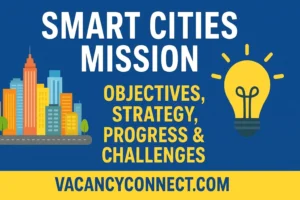Smart Cities Mission (SCM) 2025
Overview
Smart Cities Mission SCM 2025 – Objectives, Coverage, Financing, Challenges & Way Forward
Smart Cities Mission (SCM) is a flagship initiative of the Government of India aimed at driving economic growth, sustainable urbanization, and improved quality of life for citizens. Launched in 2015 by the Ministry of Urban Development (MoUD), the mission focuses on harnessing technology, innovation, and urban planning strategies to create citizen-friendly, sustainable, and technology-driven smart cities.
A smart city is not just about technology; it is about providing core infrastructure, decent living standards, sustainable environments, efficient mobility, and digital governance. The Smart Cities Mission has become a model for urban transformation in India, covering 100 cities across the country.
| Particulars | Details |
|---|---|
| Scheme Name | Smart Cities Mission (SCM) |
| Launched By | Ministry of Urban Development, Government of India |
| Launch Year | 2015 |
| Coverage | 100 Cities |
| Duration | Initially 2015–2020, extended further |
| Funding Pattern | Centrally Sponsored Scheme |
| Total Central Outlay | ₹48,000 Crore |
| Objective | To promote sustainable, inclusive development and provide core infrastructure with smart solutions |
Objectives of Smart Cities Mission
The main objectives of the Smart Cities Mission are:
To provide core infrastructure and a decent quality of life for citizens.
To promote sustainable urban development and clean environments.
To ensure inclusive growth by addressing the needs of all communities.
To develop replicable models of smart cities that can serve as examples for other urban regions.
To apply smart solutions in sectors like transport, sanitation, energy, healthcare, education, and governance.
Smart Cities Mission Strategy
The mission follows a two-pronged strategy:
Pan-City Initiative: At least one smart solution is applied city-wide (e.g., smart transport, IT-based governance).
Area-Based Development: Cities develop areas step by step through three models:
Retrofitting – Improving existing areas with smart infrastructure.
Redevelopment – Replacing old areas with planned layouts and advanced facilities.
Greenfield Development – Creating new, sustainable urban areas.
Core Infrastructure Elements of Smart Cities
A smart city must ensure the following core infrastructure elements:
Adequate water supply
Assured electricity supply
Sanitation and solid waste management
Efficient public transport & urban mobility
Affordable housing (especially for the poor)
Robust IT connectivity & digitalization
E-governance & citizen participation
Sustainable environment
Safety & security (especially for women, children & elderly)
Quality healthcare and education facilities
Coverage and Duration
The Smart Cities Mission initially aimed to cover 100 cities between 2015–2020.
The mission may continue further based on evaluation and learnings from Phase 1.
Cities were selected through a competitive process called the Smart City Challenge.
Financing of Smart Cities Mission
| Source | Contribution |
|---|---|
| Central Government | ₹48,000 Crore (₹100 Crore per city per year) |
| State Government/ULB (Urban Local Body) | Matching Share (₹48,000 Crore approx.) |
| Total Estimated Govt. + ULB Funding | ~₹1 Lakh Crore |
| Additional Funding | Public-Private Partnerships (PPP), Municipal Bonds, Multilateral Agencies |
The scheme is operated as a Centrally Sponsored Scheme (CSS). Apart from government funding, private sector participation and innovative financing tools such as municipal bonds are encouraged.
Progress of Smart Cities Mission
In the first three years, 89 cities were selected under the mission.
Cities like Pune, Bhubaneswar, and New Delhi have shown strong progress:
Pune: Issued smart city municipal bonds to raise funds.
Bhubaneswar: Developed multi-modal transport hubs and hi-tech traffic systems.
NDMC (Delhi): Implemented smart sewerage, Wi-Fi street lights, and city surveillance.
However, many cities are still in the planning or early implementation stage.
Private investment has been limited, and financial closures are delayed.
Challenges in Smart Cities Mission
Despite progress, SCM faces several challenges:
Governance Issues: Smart cities operate as Special Purpose Vehicles (SPVs), sometimes overlapping with local governance.
Islands of Development: Area-based development may only benefit 2–3% of the urban area.
Weak Urban Local Bodies (ULBs): Lack of technical and financial capacity.
Data Limitations: State and local governments often lack high-quality data for planning.
Environmental Concerns: Infrastructure development sometimes impacts green cover.
Citizen Participation: Limited involvement of citizens in planning and execution.
Way Forward
For successful implementation, the Smart Cities Mission must:
Strengthen Urban Local Bodies with technical expertise and financial autonomy.
Adopt a data-driven approach for transport, waste management, and housing.
Focus on comprehensive transformation of fewer cities at a time instead of fragmented projects.
Encourage greater private sector participation and innovative financing.
Ensure environmental protection during infrastructure development.
Enhance citizen participation from planning to implementation.
Develop replicable models for smaller towns and cities.
Conclusion
The Smart Cities Mission (SCM) is a landmark initiative in India’s urban transformation journey. While challenges remain in financing, governance, and execution, the mission has already created a framework for sustainable, citizen-centric urban development.
The way forward lies in strengthening local governance, encouraging private investment, and ensuring inclusivity so that smart cities do not become isolated islands of development. Instead, they should become replicable models of innovation, sustainability, and good governance for the entire country.
Smart cities should prioritize clean air, efficient mobility, reliable civic services, affordable housing, and digital governance—ultimately improving the quality of life for all citizens.
Recent Posts
Upcomming Vacancies
- DSSSB Primary Teacher PRT Recruitment 2025 Apply Online for 1180 Posts
- RBI Grade B Officer Vacancy 2025 Online Form – Apply Now
- Exim Bank Officers Recruitment 2025 – Apply Online
- NHPC 248 Non-Executive Recruitment 2025 – Apply Online
- GSSSB 53 Post Recruitment 2025 – Apply Online
- DEE Assam 120 Special Educator Recruitment 2025 – Apply Online
- Telangana MHSRB Recruitment 2025 – Apply Online for 1623 Posts

